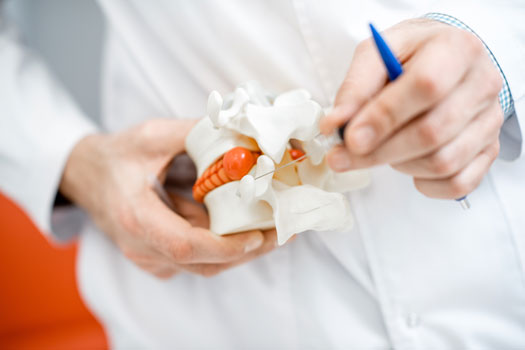
Discectomy surgery for a herniated or ruptured spinal disc is effective for many patients. Still, there are times when the discomfort experienced prior to treatment returns. This is most often caused by disc reherniation, an issue that can affect the same area or nearby parts of the lumbar spine. Below, we go over some of the more common symptoms associated with disc reherniation so you'll know when to discuss your concerns with your doctor or surgeon.
Pre-Surgery Symptoms Returning Weeks or Months Later
After a discectomy, most patients experience immediate relief from the symptoms of their disc herniation. However, you may experience soreness or discomfort during your initial recovery period, and this isn't necessarily related to disc reherniation. This type of discomfort is often related to the healing process. It's also sometimes a sign you're overdoing it or pushing yourself too hard as you recover and get back to your regular activities.
Reherniation is more likely to produce symptoms several weeks or months after surgery. It could even be a year or more after your initial surgery before reherniation symptoms develop. At any time beyond the initial recovery period, disc reherniation may produce symptoms similar to what you experienced pre-surgery. These may include:
• Pain around where the disc was fully or partially removed
• Numbness, tingling, and other sensations extending to nearby areas
• A feeling of general weakness around the affected area or nearby
Radiating Nerve Pain
A classic symptom of disc herniation is discomfort that extends along the affected nerve's pathway. For instance, this can happen if not enough disc material is removed to completely take pressure off a nearby nerve. For this reason, some surgeons choose to remove all of the disc material after the first herniation. If the sciatic nerve that starts in your lower back area is irritated by remaining disc material, you may notice any of the following symptoms:
• Pain extending to one leg
• Numbness, tingling, or general muscle weakness in the buttocks, hips, or pelvic area
• Discomfort that returns or gets worse when you sit or get up
Discomfort Associated with Different Movements
Disc reherniation produces symptoms very similar to what you may have noticed when you first sought treatment for a herniated disc. One of these is discomfort that's largely affected by your various movements. This could be sharp pain or burning sensations felt when you reach up to a high shelf or discomfort that becomes noticeable when you bend, twist, or lift something.
Herniated Disc Symptoms Developing in a Different Area
Painful issues may not develop in the exact same spot where you had your initial surgery. One way this can happen is if another spinal disc becomes weak enough to become herniated and irritates a different nerve. Should this happen, you may notice herniated disc symptoms affecting areas where you previously didn't have any noticeable discomfort.
What to Do if You Suspect Disc Reherniation
• Talk to your doctor or surgeon
• Precisely describe the symptoms you’re noticing
• Be open to trying nonsurgical therapeutic remedies, such as sciatic nerve stretches, that could be beneficial for you
Even though discectomy surgery is a common and generally quite successful procedure, a hole is frequently left in the outer wall of the disc. In fact, 70 percent of all reherniations come from large holes in the disc. These reherniations often require additional surgery or even spinal fusions. Fortunately, there’s a new treatment specifically designed to close the large holes that are often left in spinal discs after discectomy surgery. Barricaid is a bone-anchored device proven to reduce reherniations, and it’s been shown to be 95 percent effective in a large study. This means 95 percent of patients weren’t reoperated for a recurrence of their herniated disc in the 2-year study timeframe.
If you have any questions about the Barricaid treatment or how to get access to Barricaid, ask your doctor or contact us at 844-288-7474.
For full benefit/risk information, please visit: https://www.barricaid.com/instructions.


Comments